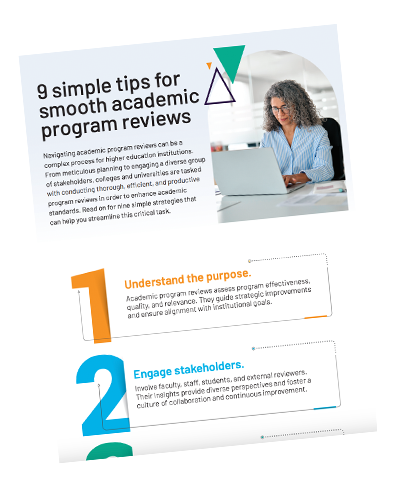9 simple tips for smooth academic program reviews
Navigating academic program reviews can be a complex process for higher education institutions. From meticulous planning to engaging a diverse group of stakeholders, colleges and universities are tasked with conducting thorough, efficient, and productive program reviews in order to enhance academic standards. Read on for nine simple strategies that can help you streamline this critical task.
-
Understand The Purpose
Academic program reviews assess program effectiveness, quality, and relevance. They guide strategic improvements and ensure alignment with institutional goals.
-
Engage Stakeholders
Involve faculty, staff, students, and external reviewers. Their insights provide diverse perspectives and foster a culture of collaboration and continuous improvement.
-
Collect & Analyze Data
Use qualitative and quantitative data. Evaluate student learning outcomes, graduation rates, employment statistics, and feedback to identify strengths and areas for improvement.
-
Align With Institutional Goals
Ensure programs align with the institution’s mission, strategic plan, and accreditation standards. This alignment demonstrates coherence and commitment to overall institutional success.
-
Develop Actionable Recommendations
Provide clear, specific, and achievable recommendations. Focus on strategies to enhance program quality, resource allocation, and student success.
-
Implement & Monitor Improvements
Create a timeline and assign responsibilities for implementing recommendations. Regularly review progress and make adjustments as needed to achieve desired outcomes.
-
Document The Process
Maintain thorough documentation of the review process, findings, and actions taken. This transparency supports accountability and provides a reference for future reviews.
-
Seek External Feedback
Invite external experts to review and provide feedback. Their impartial perspective can identify blind spots and suggest innovative solutions.
-
Foster A Culture Of Continuous Improvement
Encourage ongoing assessment and refinement of programs. Emphasize the importance of adaptability and responsiveness to changing educational needs and trends.
Learn more about 9 simple tips for smooth academic program reviews.
Download Now






